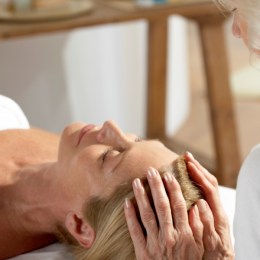Equine [horse] therapy has long been a source of treatment for adults and children with cognitive disorders such as autism, addictions and emotional disorders, but therapeutic horse riding and experiences can be beneficial to all of us.
Those who’ve seen The Horse Whisperer, the 1998 box office hit starring Robert Redford and that made a star of the young Scarlett Johansson (pictured top), would have had an insight into the profound healing impact of horsing around.
Proponents of the therapy say that through building a relationship with such a powerful yet sensitive animal as a horse we are better able to grow emotionally.
“As people travel to Gwinganna to get downtime or detox from day to day life, they’re likely frantically attending to last-minute calls and emails,” says marketing manager Tracy Willis.
“So when they arrive, guests are often looking to maximise the results of their stay and may try things they have never done before, such as have equine therapy.
“Since Gwinganna has been offering equine sessions, we have had exceptional feedback and have now added three more options for guests, two of which were created especially for us.
“Gwinganna is one of the few spas in the world where you can have this kind of experience.
“Led by a specialty equine therapy coach, guests will experience an insightful, interactive journey with one of our horses. They are usually amazed at what insight and reflection is brought to their attention.

“Horses read your body language and feel your energy; they literally mirror human emotions and react accordingly, offering an instant perspective on a person’s ability to communicate non-verbally.
“Sessions focus on developing effective people skills and emotional intelligence. It has benefited many people and is a popular option, so we recommend that interested guests request a session ahead of their visit.”
Building on this, a new study has provided evidence that there are numerous longterm health benefits in staying at a wellness retreat (um, doh!).
A team from Melburne’s RMIT University conducted the study on guests attending Gwinganna Lifestyle Retreat’s seven night detox program, recently publishing the significant results in The Journal of Alternative and Complementary Medicine.
Professor Marc Cohen, Professor of Health Sciences at RMIT, who engineered the study, says: “This research shows that health retreat experiences can produce a wide range of physical, psychological and cognitive benefits that last way beyond the retreat itself.”
General Manager and Wellness Director Sharon Kolkka says: “The study provides evidence of what we have known for more than 11 years. The transformation we see in guests from the beginning to the end of their week-long stay is remarkable.
“The results confirm the validity of a retreat experience in maintaining optimum wellness and as a means to address lifestyle imbalances and actively prevent disease.”
The results of the study show that retreat experiences provide a unique opportunity for people to escape from unhealthy routines and engage in healthy practices and activities that lead to immediate and sustained health benefits.
During the study, guests were invited to participate in a number of tests to measure different aspects of their health and wellbeing including general health, dietary habits, depression, anxiety, stress, mood, sleep quality, and self-efficacy.
A urine sample was also taken to measure the presence of pesticide metabolites before and after consuming organic freshly prepared meals. These tests were conducted upon arrival and departure, as well as six weeks post-visit.
At the conclusion of the program, average abdominal girth was reduced by 2.7cm and there was an average 1.6kg reduction in weight.
All questionnaire scores regarding depression, anxiety, stress, mood and sleep quality indicated statistically significant improvement upon departure, except for health symptom frequency and severity which continued to improve and became statistically significant in the six week follow up testing.
Urine tests after the seven-night stay revealed that traces of pesticides present at the start of the program disappeared after a week, highlighting both the benefits of eating organic produce and eating foods to improve the body’s detoxification and elimination pathways.
The authors concluded that an integrated lifestyle experience was effective in improving multiple dimensions of health and wellbeing with the participants that were most unhealthy on arrival experiencing the greatest improvements.
The research suggests that the element of digital detox as well as Gwinganna’s daily schedule supporting circadian rhythm (sleep cycle) recalibration contributed to the improvements in perceived stress and sleep.
One of Gwinganna’s foundational principles is delivering evidence-based educational content while providing guests with an experiential preventative approach to maintaining their wellness.
Professor Cohen added: “Retreat experiences that engage people in healthy lifestyle practices need to be considered seriously by the medical profession and health insurers as ways to combat the epidemic of lifestyle related chronic disease.
“Publishing research on the multiple health and wellbeing benefits of a week-long wellness retreat, including proof that the results are sustained for up to six weeks after the experience, is critical in helping the wellness industry better communicate the value of immersive wellness stays,” says Susie Ellis, Chairman and CEO of the Global Wellness Institute, a non-profit organisation with a mission to empower wellness worldwide by educating public and private sectors about preventative health and wellness.
“The Global Wellness Institute applauds RMIT University for its commitment to wellness research.”




